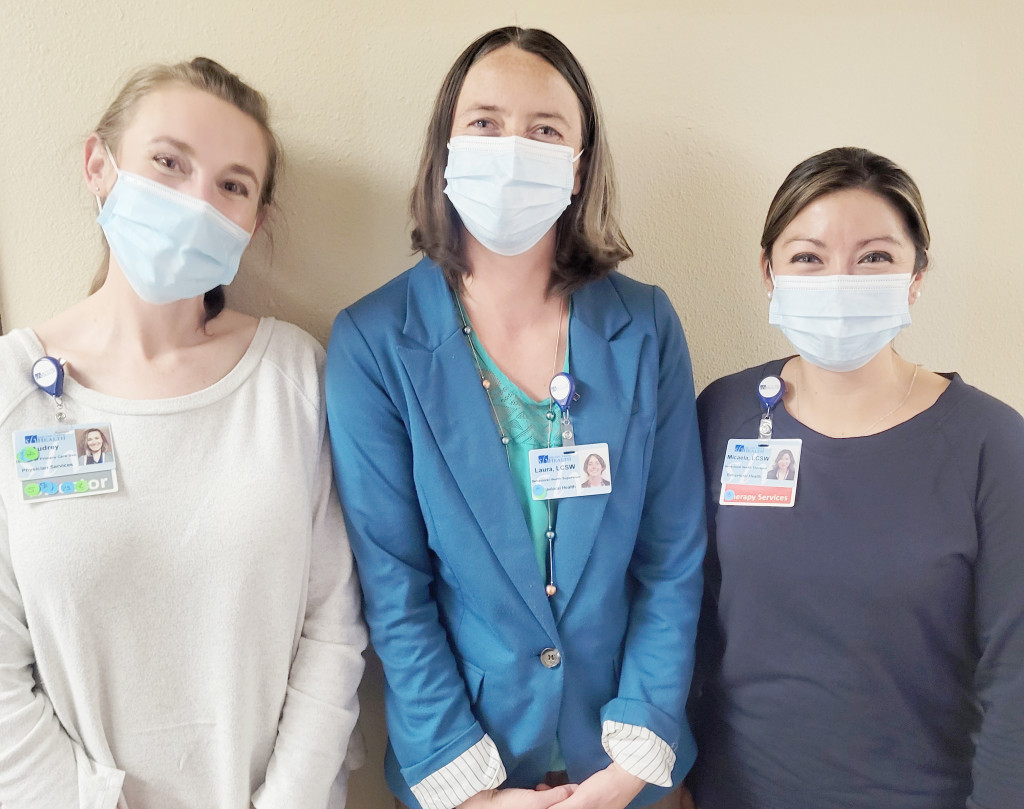Anything but normal

A day in the life of SLV Health Social Workers
For most people, their normal work schedule and responsibilities usually look the same every day. But for SLV Health social workers Micaela Romero, Laura Burkhardt and Audrey Reich-Loy, their days are anything but normal.
Laura Burkhardt, a licensed clinical social worker as well as a licensed addiction counselor, starts her day around 7 a.m., seeing up to nine clients a day with a variety of needs from chronic pain to grief and loss. “The majority of the people I work with have survived trauma,” Burkhardt explained. “We help people gain a deeper understanding of the mind-body connection, and motivate them to make positive changes that will improve their overall health status.”
Micaela Romero, a licensed clinical social worker, finds her days are just as unpredictable. Not only seeing patients but also doing weekly group consultations, her days include regular sessions as well as unscheduled emergency interventions as needed. “My scheduled sessions last between 50 and 60 minutes, and evaluations can take up to 90 minutes,” Romero explained. “I see patients five days a week.”
Audrey Reich-Loy, a licensed clinical social worker as well as a licensed addiction counselor, is what is deemed a “macro” social worker. Macro social work centers on investigating larger-scale social problems, and developing and implementing social interventions to make positive changes at the community, state and national level.
Her days are spent in meetings related to strategic planning, operation evaluations, projects and staff management. “In between meetings, I’m typically on email or the phone with colleagues to address challenges, or working at my desk putting together reports or projects.”
While the social workers at SLV Health have differing responsibilities, they find that patients react the same when they realize who they are.
“I rarely introduce myself as a social worker, because so often there is a lot of distrust of being part of ‘The System,’” Burkhardt said. “Because social work is so broad, I explain my role as a behavioral health therapist, and that I am a member of the care team with the aim of providing whole-person care.”
Romero said she gets the full range of responses, but that most people are surprised that she does therapy and is not part of CPS. “I think there is still a stigma regarding mental health and receiving mental health therapy, so I think that plays a role as well,” she said.
With the onset of the COVID-19 pandemic last year, all three had to pivot quickly to continue to meet the needs of the community and its residents. Change and adaptation is crucial, and there was a definite shift in how they operated not only as a team but with their clients as well.
“COVID has exasperated pre-existing mental health issues, triggered past traumas, created social isolation, removed safety nets and stripped away people’s usual coping mechanisms,” said Burkhardt. “However, it also helped to destigmatize reaching out for mental health support.”
Romero stated that telehealth played a large role in how the team interacted with patients. “I have had patients that have never seen my face,” she said. “This might not seem like a big deal, but so much of the work we do is based on in-person, in-the-moment interactions. I think trust is built when people see our faces, and because of the masks, that’s blocked.”
Reich-Loy explained the broader role she took on during the pandemic. “I have been given the opportunity to be involved in the SLV Health response to the COVID pandemic, including supporting our initial response in our clinics, helping to implement new services and supporting our teams in starting the respiratory (COVID) clinic and the vaccination events. It is important work and I feel privileged to be a part of it.
My goal is to ensure that our community trusts in the healthcare system and doesn’t put off getting the care they need.” “The San Luis Valley has really touched me,” Burkhardt said. “It has been such an honor to get to know everyone and work within this community, to learn the complex cultural components of living in a rural area and getting to make an impact.”
Romero agreed. “The root of social work is the ‘whole person’ or holistic approach,” she explained. “Social workers will take into account all parts of a person’s experience, and it helps us to make appropriate referrals for treatment outside of our scope of practice.”
The team is not alone in their work. Often they partner with organizations in the community such as Tu Casa, La Puente, Crossroads and others that help with food insecurity, inadequate housing and safety concerns.
“I am happy when I see someone make a breakthrough in therapy and discover something about themselves,” Burkhardt said. “Sometimes after a session, I feel calm and hopeful, and other times I feel anxious or tired. It helps me to remember the feelings I have to provide insight into the session and the person I’m working with.” Reich-Loy has enjoyed being part of a team that shares a common goal and it results in positive change for the team and the community, saying, “Whether volunteering or in my ‘day job,’ I’m, always relying on my social work education.” Romero enjoys the patient interaction. “I am always humbled by what my patients are willing to share with me and the resilience of the human spirit,” she said. “My happiest experiences have been being a part of the growth and healing of patients that have allowed them to live a fuller and more authentic life.”
For more information about how SLV Health’s behavioral health program can help, please go online to slvhealth.org.



